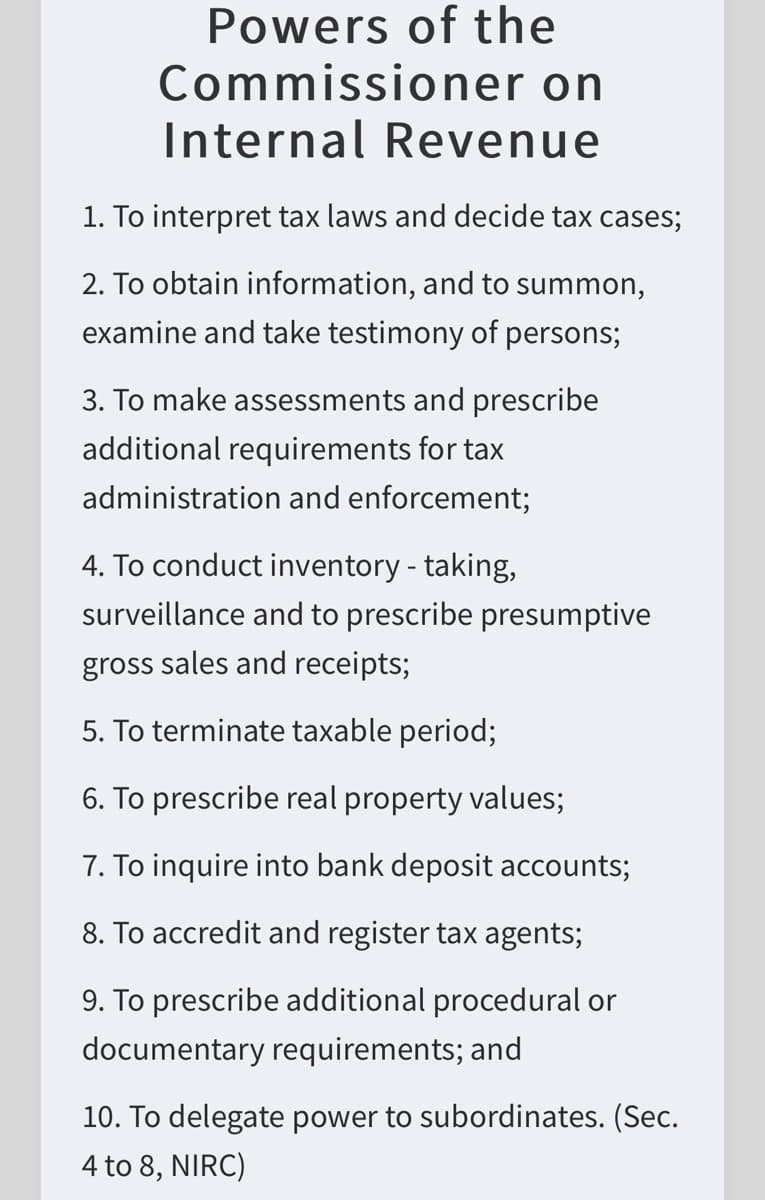Powers of the Commissioner on Internal Revenue 1. To interpret tax laws and decide tax cases; 2. To obtain information, and to summon, examine and take testimony of persons; 3. To make assessments and prescribe additional requirements for tax administration and enforcement; 4. To conduct inventory - taking, surveillance and to prescribe presumptive gross sales and receipts; 5. To terminate taxable period; 6. To prescribe real property values; 7. To inquire into bank deposit accounts; 8. To accredit and register tax agents; 9. To prescribe additional procedural or documentary requirements; and 10. To delegate power to subordinates. (Sec. 4 to 8, NIRC)
Powers of the Commissioner on Internal Revenue 1. To interpret tax laws and decide tax cases; 2. To obtain information, and to summon, examine and take testimony of persons; 3. To make assessments and prescribe additional requirements for tax administration and enforcement; 4. To conduct inventory - taking, surveillance and to prescribe presumptive gross sales and receipts; 5. To terminate taxable period; 6. To prescribe real property values; 7. To inquire into bank deposit accounts; 8. To accredit and register tax agents; 9. To prescribe additional procedural or documentary requirements; and 10. To delegate power to subordinates. (Sec. 4 to 8, NIRC)
Chapter17: Corporations: Introduction And Operating Rules
Section: Chapter Questions
Problem 15DQ
Related questions
Question
Enumerate and explain ten (10) powers of the Commissioner of Internal Revenue.
Nots: 10 powers of the commissioner is in the photo attached.

Transcribed Image Text:Powers of the
Commissioner on
Internal Revenue
1. To interpret tax laws and decide tax cases;
2. To obtain information, and to summon,
examine and take testimony of persons;
3. To make assessments and prescribe
additional requirements for tax
administration and enforcement;
4. To conduct inventory - taking,
surveillance and to prescribe presumptive
gross sales and receipts;
5. To terminate taxable period;
6. To prescribe real property values;
7. To inquire into bank deposit accounts;
8. To accredit and register tax agents;
9. To prescribe additional procedural or
documentary requirements; and
10. To delegate power to subordinates. (Sec.
4 to 8, NIRC)
Expert Solution
This question has been solved!
Explore an expertly crafted, step-by-step solution for a thorough understanding of key concepts.
Step by step
Solved in 2 steps

Knowledge Booster
Learn more about
Need a deep-dive on the concept behind this application? Look no further. Learn more about this topic, accounting and related others by exploring similar questions and additional content below.Recommended textbooks for you








Intermediate Accounting: Reporting And Analysis
Accounting
ISBN:
9781337788281
Author:
James M. Wahlen, Jefferson P. Jones, Donald Pagach
Publisher:
Cengage Learning
